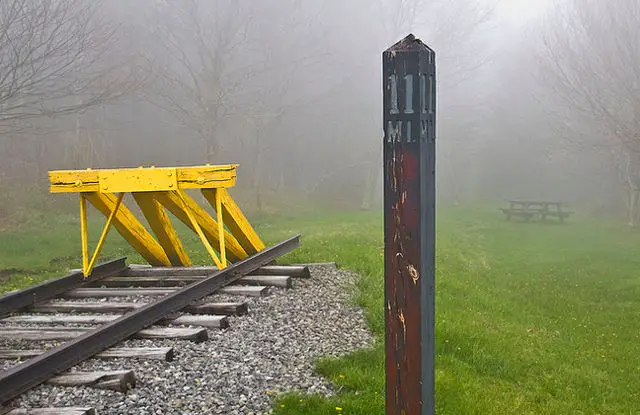Over the last couple of weeks OnTheWight has been running a series of email exchanges between Nick Finney, Isle of Wight Conservative MP Andrew Turner‘s transport advisor, and David Pugh, who is connected with the Keep Island Line in Franchise (KILF) group.
As mentioned before, the Island Line franchise is a complex subject, so we feel that it’s only right that the exchanges are published unedited, so details are not missed out.
Here’s the final exchange (for the moment) from David Pugh to Nick Finney.
Dear Nick
It is clear that this conversation is not going anywhere, so I will seek to draw it to a close. (I hear a huge sigh of relief from those copied in!)
You have demonstrated a stubborn refusal to accept the evidence-based analysis I have provided, even when I have shown your assumptions to be entirely incorrect. As I said before, it is deeply worrying that such flawed analysis is being used to shape public policy. Your refusal to accept this confirms that we will have to continue pursuing our objectives through other channels, including directly to government. It is, of course, unfortunate that we cannot rely on our MP to properly represent the interests of the Island to government on this and other matters, and he appears to be overly influenced by you. However that is the regrettable reality of the current situation.
I must pick you up on one point. You say “his [Andrew’s] proposals are a proper lifeline to the future”. How? Show us your business plan. What funding have you secured? What is your proposed operating model, and how will it close the gap between revenue and operating costs? It is, quite frankly, laughable to suggest that a totally uncosted, unfunded and undetailed aspiration amounts to a “proper lifeline to the future”. Who are you trying to kid?
Let me briefly address the points you raise from my time in office.
When you refer to the removal of £40,000 support for Island Line, I assume you are referring to the fact that the council ceased to fund concessionary travel on the trains. By way of background, you will be aware that the local authority has been required – since the days of the Labour Government – to fund concessionary travel on the buses. Yet from the start of this initiative the IW Council did not receive sufficient additional funding from government to meet the costs involved, and this remains the case.
However, when it did commence, the Conservative administration at County Hall – at its discretion – initially extended it to provide free travel for over 60s on Island Line. Given the huge cost of the concessionary fares scheme, it was subsequently decided only to fund the statutory (and related) elements, so we removed funding for concessionary travel on the trains, as well as peak-time travel on the buses. This brought us into line with what the vast majority of local authorities were doing, and has not been re-instated by our successors. The impact of this change was negligible, not least because it reverted the situation back to what it had been until relatively recently before then. Furthermore, Island Line now receives fares from those users aged over 60, and it is not inconceivable that this is generating more income than the £40k fixed amount would have provided. In any event, it is small beer in the grand scheme of things.
You then refer to the plans for Ryde Interchange, I suggest you read this paper
You will note, in paragraph 9 onwards, the Council’s frustration at Network Rail’s requirements. The most significant part of Network Rail’s intransigence was its insistence on a six month rolling break clause in the lease. The consequence of this is that the IW Council would have been investing significant amounts of public money into a scheme which could have been required to be vacated at six months’ notice. If this had happened in the first ten years, the IW Council could then have been required to pay back grant funding to DfT. For all the reasons set out in the paper, it was agreed to terminate this project.
However regrettable this was, it was the right decision, and Edward Giles and I would be happy to discuss this with you if you have any particular concerns. This other very significant aspect worth bearing in mind is that at the time of this consideration, the IW Council was seeking to persuade the DfT to allocate a multi-million pound grant to the Isle of Wight for our Highways PFI project. We had to weigh up the costs / benefits of writing off the Ryde Interchange project, and in doing so ensure that the local authority’s standing with the DfT was not harmed to the extent that it could have affected our prospects in securing the Highways PFI grant.
Put this in the context, the loss of some grant funding (and incurrence of some local costs) in relation to the Ryde Interchange – which was the right decision to make the time – pales into insignificance when compared to the £260m grant at NPV (Net Present Value) (equivalent to £487m in cash terms) – all additional grant funding – which the Council secured for investment in our roads over the current 25 year period. This remains a landmark achievement of the Conservative administration and will leave a lasting legacy to the Island – the benefits of which we are already seeing.
And to respond to your final point, I do not consider myself to be the “saviour of the Island Line” as you suggest. I am merely fighting to secure the future of the train service I use day-in, day-out. In the face of your continued obstinacy and refusal to take a pragmatic, evidence-based approach, I will continue to fight this corner – with many others. We are not going to roll over and let you ruin our local train service with your uncosted, unfunded and undetailed aspirations – hardly a “lifeline to the future”.
With best wishes
David
Image: PRORon Cogswell under CC BY 2.0





